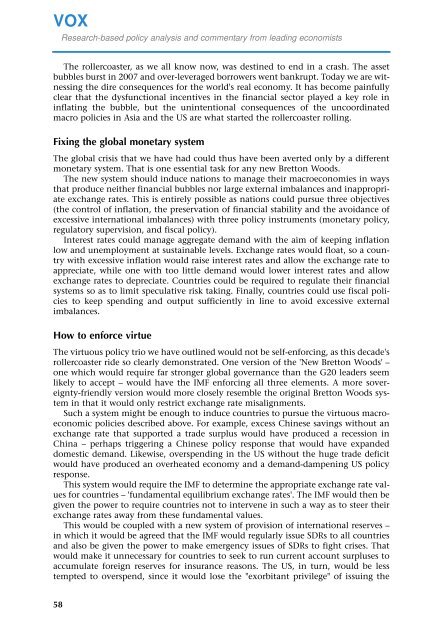What G20 Leaders Must Do To Stabilise our Economy and Fix ... - Vox
What G20 Leaders Must Do To Stabilise our Economy and Fix ... - Vox
What G20 Leaders Must Do To Stabilise our Economy and Fix ... - Vox
Create successful ePaper yourself
Turn your PDF publications into a flip-book with our unique Google optimized e-Paper software.
VOXResearch-based policy analysis <strong>and</strong> commentary from leading economistsThe rollercoaster, as we all know now, was destined to end in a crash. The assetbubbles burst in 2007 <strong>and</strong> over-leveraged borrowers went bankrupt. <strong>To</strong>day we are witnessingthe dire consequences for the world's real economy. It has become painfullyclear that the dysfunctional incentives in the financial sector played a key role ininflating the bubble, but the unintentional consequences of the uncoordinatedmacro policies in Asia <strong>and</strong> the US are what started the rollercoaster rolling.<strong>Fix</strong>ing the global monetary systemThe global crisis that we have had could thus have been averted only by a differentmonetary system. That is one essential task for any new Bretton Woods.The new system should induce nations to manage their macroeconomies in waysthat produce neither financial bubbles nor large external imbalances <strong>and</strong> inappropriateexchange rates. This is entirely possible as nations could pursue three objectives(the control of inflation, the preservation of financial stability <strong>and</strong> the avoidance ofexcessive international imbalances) with three policy instruments (monetary policy,regulatory supervision, <strong>and</strong> fiscal policy).Interest rates could manage aggregate dem<strong>and</strong> with the aim of keeping inflationlow <strong>and</strong> unemployment at sustainable levels. Exchange rates would float, so a countrywith excessive inflation would raise interest rates <strong>and</strong> allow the exchange rate toappreciate, while one with too little dem<strong>and</strong> would lower interest rates <strong>and</strong> allowexchange rates to depreciate. Countries could be required to regulate their financialsystems so as to limit speculative risk taking. Finally, countries could use fiscal policiesto keep spending <strong>and</strong> output sufficiently in line to avoid excessive externalimbalances.How to enforce virtueThe virtuous policy trio we have outlined would not be self-enforcing, as this decade'srollercoaster ride so clearly demonstrated. One version of the 'New Bretton Woods' –one which would require far stronger global governance than the <strong>G20</strong> leaders seemlikely to accept – would have the IMF enforcing all three elements. A more sovereignty-friendlyversion would more closely resemble the original Bretton Woods systemin that it would only restrict exchange rate misalignments.Such a system might be enough to induce countries to pursue the virtuous macroeconomicpolicies described above. For example, excess Chinese savings without anexchange rate that supported a trade surplus would have produced a recession inChina – perhaps triggering a Chinese policy response that would have exp<strong>and</strong>eddomestic dem<strong>and</strong>. Likewise, overspending in the US without the huge trade deficitwould have produced an overheated economy <strong>and</strong> a dem<strong>and</strong>-dampening US policyresponse.This system would require the IMF to determine the appropriate exchange rate valuesfor countries – 'fundamental equilibrium exchange rates'. The IMF would then begiven the power to require countries not to intervene in such a way as to steer theirexchange rates away from these fundamental values.This would be coupled with a new system of provision of international reserves –in which it would be agreed that the IMF would regularly issue SDRs to all countries<strong>and</strong> also be given the power to make emergency issues of SDRs to fight crises. Thatwould make it unnecessary for countries to seek to run current account surpluses toaccumulate foreign reserves for insurance reasons. The US, in turn, would be lesstempted to overspend, since it would lose the "exorbitant privilege" of issuing the58














